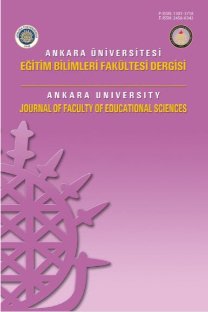Effects of Cooperative Learning vs. Traditional Instruction on Prospective Teachers’ Learning Experience and Achievement
Öz The study investigated the effects of three experimental conditions on prospective teachers’ learning experience and achievement in the course of Educational Psychology. The conditions comprised (a) Traditional Instruction (TI) (b) Cooperative Learning Loosely Structured (CLLS) and (c) Cooperative Learning Students Team Achievement Division (CL STAD) model. The study explored change in students’ scores on learning experience and difference in achievement under these experimental conditions. Thirty-two student teachers enrolled in master degree program were the subjects of the study. Repeated measure design was used for the study. Thirty intervention lessons (ten in each condition) were delivered during the whole semester. Learning experience measure and Achievement test were administered at the end of each phase. The results of repeated measure analyses of variance (ANOVA) reveal that there is statistically significant difference between prospective teachers’ scores on learning experience measure across three experimental conditions. ANOVA results also reveal that there is a statistically significant difference in achievement scores favoring both CL conditions. The study concludes that cooperative learning enhances perspective teachers’ academic achievement as compared to traditional instruction and promotes enriched, enjoyable and interactive learning experience. The study has implications for teacher educators to prefer innovative instructional strategies as CL while teaching to prospective teachers
Anahtar Kelimeler:
Cooperative learning, STAD model, traditional instruction, learning experience, prospective teachers
- ISSN: 1301-3718
- Yayın Aralığı: Yılda 3 Sayı
- Başlangıç: 1968
- Yayıncı: ANKARA ÜNİVERSİTESİ (EĞİTİM BİLİMLERİ FAKÜLTESİ)
Sayıdaki Diğer Makaleler
Öğretim elemanlarının örgütsel yaratıcılık algıları
Farklı standart belirleme yöntemlerinin geçme puanları üzerine etkisi
Selahattin GELBAL, Sevda ÇETİN
Özel gereksinimli olan ve olmayan öğrencilerin öğretmenlerinin öz-yetkinlik inançları
Çevrimiçi Öğrenme Ortamında Algılanan Sosyalleşme Ölçeğinin Geçerlik ve Güvenirlik Çalışması
Vocational High School Female Students’ Opinions About Application Level of Skill Education
“Webquest” kullanımına ilişkin algı ölçeğinin geliştirilmesi
Examining Teachers’ Self-Efficacy Beliefs of Students With and Without Specıal Needs
